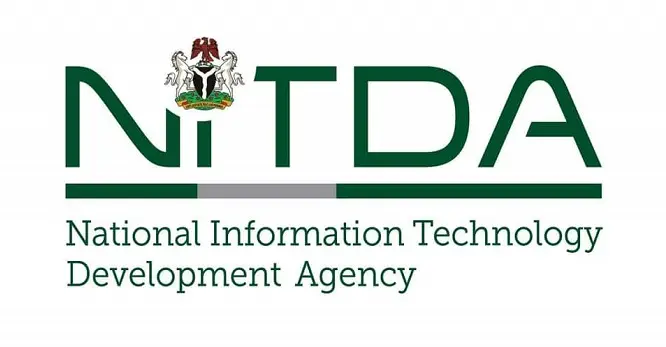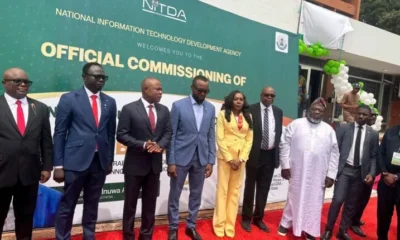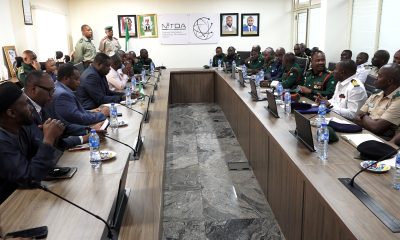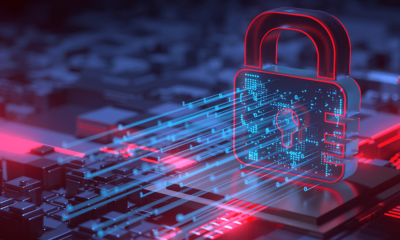News
NITDA launches digital innovation competition to address infrastructural challenges

NITDA launches digital innovation competition to address infrastructural challenges
The National Information Technology Development Agency (NITDA) says it has launched the 2024 Digital Nigeria Innovation Challenge competition, aimed at addressing infrastructural challenges in the country.
Director of Corporate Affairs and External Relations of NITDA, Mrs Hadiza Umar, said this in a statement personally issued in Abuja on Thursday.
Umar said the competition tagged “Mapping Nigeria’s Future-Infrastructure for Development” began on Sept. 11 and would end on Oct. 23.
She also said the pitching of the challenge would be at the 2024 Digital Nigeria International Conference and Exhibition, expected to be held from Oct. 22 to 24.
“The 2024 Innovation Challenge is set to empower the next wave of Nigeria’s brightest innovators.
“It’s more than just a competition, it’s an opportunity to leverage technology and creative problem-solving to tackle the pressing infrastructure challenges facing the nation.
“This initiative plays a pivotal role in achieving the core objectives of President Bola Tinubu’s Renewed Hope Agenda, driving economic growth and fostering job creation.
“Aligned with NITDA’s mission to promote innovation and entrepreneurship, the challenge supports Nigeria’s leap towards a thriving digital economy under the Ministry of Communications, Innovation, and Digital Economy’s Strategic Blueprint,” she said.
According to her, with a focus on building a future-ready digital Nigeria, participants will collaborate in teams, using digital tools and techniques to digitally map key infrastructure across Nigeria.
She added that the maps would highlight essential facilities like hospitals, schools, roads, and utilities and provide insights needed to drive sustainable development across the country.
“Through this initiative, we intend to engage participants in real-world data collection and digital mapping.
“The challenge will showcase critical infrastructure needs and opportunities in Nigeria, foster community engagement among diverse groups of participants.
“It will enhance skills in Geographical Information Systems, data science, and storytelling among the youth and professionals.”
The director added that the challenge would be in three stages, which included the state ,regional and national levels.
According to her, competitors from all 36 states and the FCT will battle it out, with 37 teams moving to the next round.
“These qualifiers will represent their regions across six geo-political zones, with six regional winners emerging.
“The regional champions will gather in Abuja for the ultimate showdown at the Digital Nigeria conference.
“Each of the six regional winners will walk away with N1 million, while the national winner will take home the grand prize of N5 million,” she said.
Umar reassured that NITDA continued to shape Nigeria’s IT landscape with innovative policies and standards that would create digital jobs, foster entrepreneurship and nurture the next generation of tech talent.
Headlines
NCBN, OISD Seek Strategic Partnership with ASR Africa

NCBN, OISD Seek Strategic Partnership with ASR Africa
By Matthew Eloyi
The Managing Director and Chief Executive Officer of the Nigeria Customs Broadcasting Network (NCBN), Mr. Jamilu Yusuf, has led a delegation on a courtesy visit to the Managing Director of the Abdul Samad Rabiu Africa Initiative (ASR Africa), Dr. Ubon Udoh, to explore areas of mutual collaboration.
Mr. Yusuf, who also serves as the Executive Director of the Organisation for Innovation and Sustainable Development (OISD), commended ASR Africa for its transformational impact in critical sectors such as education, healthcare, social development, and institutional strengthening across Nigeria and the African continent.
He highlighted NCBN’s commitment to promoting institutions and initiatives that drive sustainable development, noting that a strategic communication partnership with ASR Africa would help amplify the organisation’s achievements and further inspire positive change.
Mr. Yusuf also proposed a collaboration between OISD and ASR Africa in areas including education, digital literacy, and economic empowerment, aligning with both organisations’ shared vision for inclusive growth and capacity building.
In response, Dr. Udoh welcomed the partnership proposals, expressing ASR Africa’s readiness to collaborate with NCBN on strategic communication initiatives. He also affirmed the initiative’s interest in working with OISD on education empowerment programmes.
Dr. Udoh further used the occasion to congratulate the Comptroller-General of Customs, Bashir Adewale Adeniyi, on his recent election as the Chairperson of the World Customs Organisation (WCO), describing the achievement as a testament to Nigeria’s growing influence in global customs administration.
Headlines
Akpabio Hails Okpebholo’s Supreme Court Victory, Calls It Triumph of Democracy

President of the Senate, Godswill Akpabio, has congratulated Governor Monday Okpebholo on his affirmation as the duly elected governor of Edo State by the Supreme Court, describing the ruling as a “triumph of democracy and the will of the people.”
Akpabio, in a statement personally signed and released on Friday in Abuja, applauded the apex court’s decision, saying it validated the mandate freely given to Okpebholo in the September 2024 gubernatorial election.
“What the apex court in the land has done is to affirm the will and wishes of the overwhelming majority of the people of Edo State. It shows that the election was transparent, free and fair,” Akpabio stated.
He added that, “The declaration by the Supreme Court in favour of Sen. Okpebholo against Mr Asue Ighodalo of the Peoples Democratic Party (PDP) has proven that elections are won at the ballot and by people who have identified with the grassroots.”
The Senate President said the judgment reaffirms the strength of Nigeria’s democratic institutions and the popularity of the All Progressives Congress (APC) in Edo State.
“This judgment has again reaffirmed the fact that democracy is at play and the people of Edo have wholeheartedly embraced the All Progressives Congress (APC) and popularly elected their preferred choice of Senator Okpebholo as their governor,” he said.
According to Akpabio, the ruling not only confirms Okpebholo’s mandate but also “paves the way for him to continue delivering exceptional service to the good people of Edo.”
He praised the governor’s performance in the past seven months, expressing confidence in his capacity to deliver more during his four-year tenure.
“My distinguished brother, His Excellency Senator Monday Okpebholo, on behalf of my family and constituents, the Senate of the Federal Republic of Nigeria, I extend my warmest congratulations to you and the wonderful people of Edo on this landmark victory at the Supreme Court.
“I wish you success and I assure you of the Senate’s support and collaboration in ensuring the state’s progress and development.
“Congratulations once again, Gov Okpebholo. I look forward to a robust working relationship with you,” Akpabio added.
In a unanimous decision, a five-member panel of the Supreme Court led by Justice Mohammed Garba dismissed the appeal filed by the PDP candidate, Mr Asue Ighodalo, for lacking merit.
The apex court upheld the earlier rulings of the Court of Appeal and the Edo State Governorship Election Petition Tribunal, both of which declared Okpebholo of the APC as the valid winner of the election.
The court ruled that the appellant failed to provide credible and admissible evidence to support claims of electoral malpractice, including over-voting and substantial non-compliance with the Electoral Act.
It further held that the PDP candidate failed to call relevant witnesses to back up some of the evidence he tendered, particularly those involving the Bimodal Voter Accreditation System (BVAS).
Some of the documents presented, the court noted, were simply “dumped” on the tribunal without demonstrating the alleged irregularities in 432 of the 4,519 polling units across the state.
Education
NELFUND Begins Upkeep Payments to Over 3,600 Students After Bank Detail Update

The Nigerian Education Loan Fund (NELFUND) has commenced the disbursement of upkeep payments to students who successfully updated their bank account details from digital wallets to commercial bank accounts.
This was announced in a statement released on Friday in Abuja by the Director of Strategic Communications of the Fund, Mrs. Oseyemi Oluwatuyi.
Oluwatuyi described the development as a significant breakthrough in addressing earlier disbursement delays.
“Over 3,600 students, who previously registered with digital-only banking platforms, have now successfully received their backlog of upkeep payments after updating their details to conventional commercial bank accounts on the NELFUND portal,” she stated.
“We appreciate the patience and understanding of all affected students during this period. Your resilience and cooperation have made this progress possible,” she added.
The NELFUND spokesperson advised students who have yet to update their bank details to raise a support ticket via the official NELFUND portal to request access for the update.
She further urged affected students to report through the IT office of their respective institutions, which would compile and forward all related cases to NELFUND for prompt resolution.
“NELFUND remains committed to ensuring that no eligible student is left behind. This resolution process is part of our broader effort to enhance the efficiency, transparency, and student-centered delivery of our support services,” she said.
Oluwatuyi encouraged students to continue engaging only through official NELFUND channels and to assist their peers who may need help navigating the update process.
She also provided contact options for inquiries, stating that the fund can be reached via email at info@nelf.gov.ng or through its official social media handles: X (formerly Twitter) @nelfund; Instagram @nelfund; and Facebook & LinkedIn: Nigerian Education Loan Fund – NELFUND.
-

 Headlines3 years ago
Headlines3 years agoFacebook, Instagram Temporarily Allow Posts on Ukraine War Calling for Violence Against Invading Russians or Putin’s Death
-

 Headlines3 years ago
Headlines3 years agoNigeria, Other West African Countries Facing Worst Food Crisis in 10 Years, Aid Groups Say
-

 Foreign3 years ago
Foreign3 years agoNew York Consulate installs machines for 10-year passport
-

 News10 months ago
News10 months agoZero Trust Architecture in a Remote World: Securing the New Normal
-

 Entertainment3 years ago
Entertainment3 years agoPhyna emerges winner of Big Brother Naija Season 7
-

 Headlines1 year ago
Headlines1 year agoNigeria Customs modernisation project to check extortion of traders
-

 Economy1 year ago
Economy1 year agoWe generated N30.2 bn revenue in three months – Kano NCS Comptroller
-

 Headlines1 year ago
Headlines1 year agoPhilippines’ Vice President Sara Duterte resigns from Cabinet














